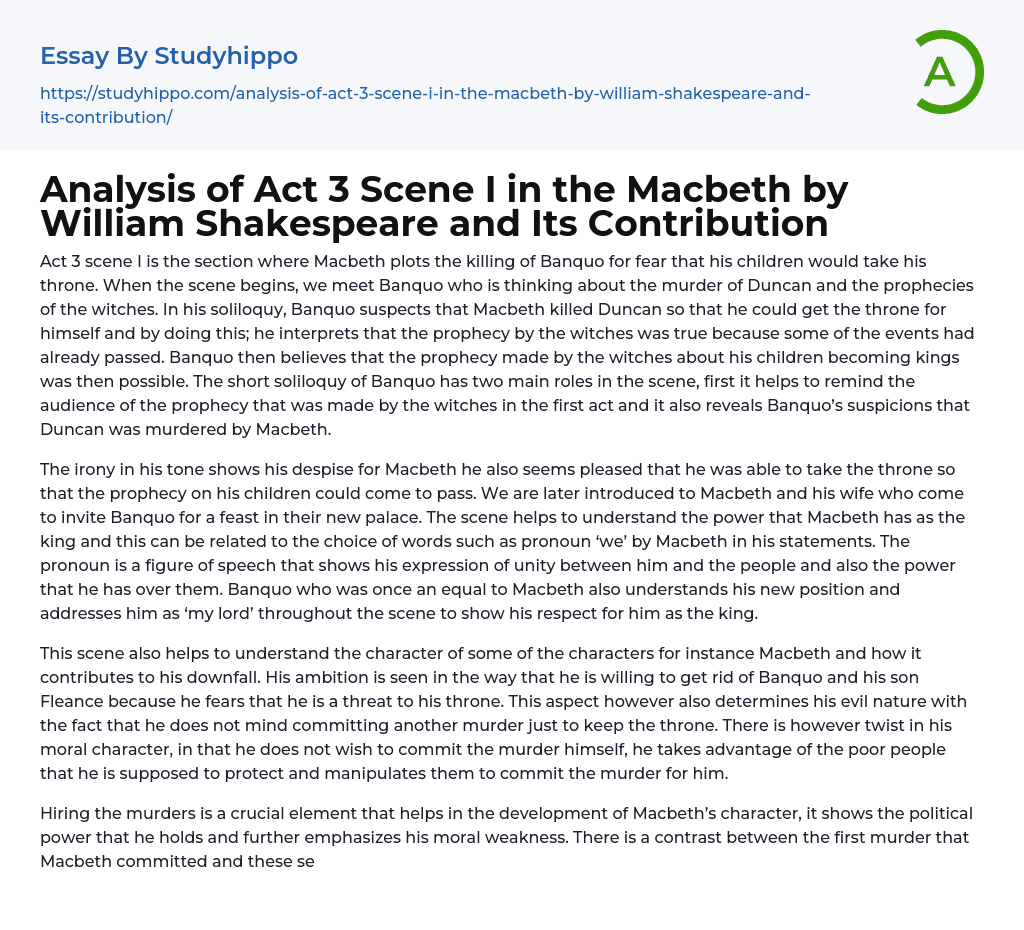

Analysis of Act 3 Scene I in the Macbeth by William Shakespeare and Its Contribution Essay Example
Act 3 scene I depicts Macbeth's plot to assassinate Banquo out of fear that Banquo's offspring would inherit the throne. The scene introduces Banquo, who contemplates the murder of Duncan and the prophecies of the witches. Through his soliloquy, Banquo speculates that Macbeth committed regicide in order to seize the throne, thereby validating the witches' prophetic words as some of their earlier predictions have already come true.
According to Banquo, the prophecy made by the witches regarding his children becoming kings is now a possibility. His soliloquy serves two purposes in the scene: it reminds the audience of the witches' prophecy from the first act and reveals Banquo's suspicion that Macbeth murdered Duncan. The use of irony in Banquo's tone indicates his dislike for Macbeth, but he is also pleased that he has taken the throne so t
...hat the prophecy can come true for his children. Macbeth and his wife later invite Banquo to a feast at their new palace. This scene highlights Macbeth's power as king, as evidenced by his choice of pronoun ("we") in his statements. This pronoun symbolizes unity between Macbeth and his subjects and represents the power he holds over them.
Banquo, who was once equal to Macbeth, acknowledges Macbeth's new role as king and shows respect by calling him 'my lord' during their encounter. This conversation reveals insights into Macbeth's character and how it ultimately leads to his downfall. Macbeth's ambition becomes evident in his willingness to get rid of Banquo and Fleance, believing they pose a threat to his throne. This ambition also exposes his evil nature, as he is willing to commit another murder just to maintain his position. Interestingly
instead of carrying out the assassination himself, Macbeth manipulates and takes advantage of vulnerable individuals he should protect. By hiring assassins, Macbeth highlights both his political power and moral weakness.
The scene serves to highlight Macbeth's character transformation through the contrast between his first murder and his current plans. Originally, Macbeth was a fearless warrior who personally confronted his enemies. However, now he has become a coward who prefers to have others commit acts of violence on his behalf. This change is evident in his reaction to the idea of murder; in line (133), he expresses the need for protection during the act. Additionally, this scene also develops Lady Macbeth's character. She manipulates Macbeth into believing that Banquo poses a threat to their rule and advocates for his elimination. This showcases her malevolence, intelligence, and power within a society that restricts women.
Despite lacking any power to make rigid decisions in her society, Lady Macbeth is capable of exerting influence by manipulating her husband. The overarching theme explored in this scene is the thirst for power, which is evident among all the characters. Banquo, one such character, suspects that Macbeth murdered Duncan, yet he disregards it as he sees it as an opportunity for his children to become kings, just as the witches foretold. Lady Macbeth is another character embodying this theme, as she urges her husband to eliminate Banquo, perceiving him as a threat to their throne. Recognizing her own inability to act, she manipulates and pressures her husband into finding a solution that ensures her position as the queen. Macbeth also contributes to the theme of greed for power.
Macbeth, at first seeming unconcerned about
Banquo's threat to his throne, is easily convinced by Lady Macbeth to take action in eliminating him. Even though Macbeth initially doubts the witches' prophecy (line 70), he cannot bear the idea of losing the throne and refuses to dismiss the possibility that Banquo's descendants may seize it. Through his soliloquy, it becomes apparent that Macbeth feels insecure due to lacking any children who could succeed him, rendering his quest for kingship futile. He believes that all he has done to attain the throne ultimately benefits Banquo and his future heirs, an intolerable notion for him. These events culminate in Macbeth's downfall; driven by greed for power, he plots Banquo's murder—a choice that ultimately costs him his throne.
Macbeth's frequent use of the word 'tomorrow' in the scene foretells his downfall. Despite his extended reign as king, Macbeth displays clear negligence for time by repeatedly employing the term 'tomorrow' in his utterances. Ironically, this word symbolizes optimism for favorable events in Macbeth's future; however, it ultimately returns to haunt him and foreshadows his concluding speech in Act five.
The irony of this scene lies in the fact that Macbeth's pursuit to prevent the witches' prophecy from coming true ultimately results in him losing the throne at the end of the play.



